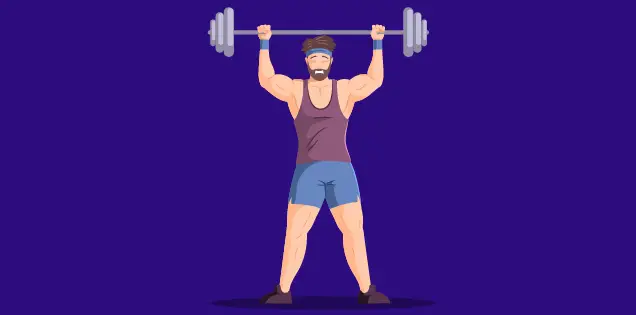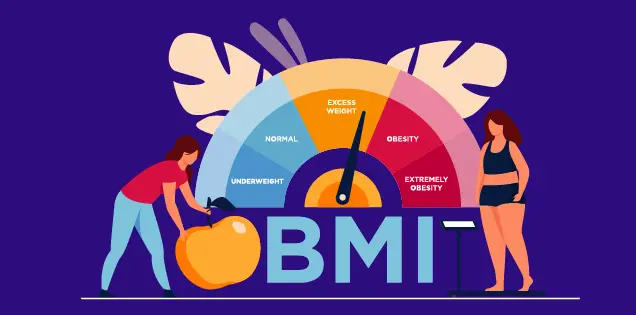So, you’ve been working hard at the gym, eating healthy, and watching your calorie intake, but the number on the scale doesn’t seem to change. So you may wonder “why do i weigh more than i look”?
There are a few reasons why this might be the case. First, maybe you’ve put on a little muscle or water weight. Second, maybe you’re retaining more water than usual because of a hormonal imbalance or stress.
Whatever the reason, don’t worry – we’re here to help you figure it out. In this post, we’ll explore why you might weigh more than you look and what you can do about it.
Can a Person Weigh More Than They Look?

It seems like a valid question. After all, if you carry more weight than you should, it stands to reason that you’d look a little bit heavier, right? But this isn’t always the case. Sometimes people who are significantly overweight can look surprisingly thinner.
So what’s going on here? It all comes down to body composition. You might have a lot of muscle mass, which will weigh more than fat. And even if you have a lot of fat on your body, that doesn’t mean you’ll be heavy. So it’s not always an accurate indicator of how much weight you carry.
There’s no definitive answer to this question, but it’s important to remember that weight and appearance aren’t always correlated.
Why Do I Weigh More Than I Look?
Here are some reasons why you weigh more than you look:
Gains

As an exercise physiologist, Larry Weilland, MS of the Northwestern Medicine Delnor Health and Fitness Center, stated that one of the reasons a person might gain weight yet seem thinner is working out and growing muscles. Larry said muscle is denser than fat, so the same amount of muscle and fat would weigh differently.
“Even while your muscular mass weighs something beyond your fat, it occupies a smaller space, which is why you seem slimmer and more toned,” according to Xcite Fitness exercise physiologist Krissi Williford, MS, CPT.
Lowered Body Fat Percentage

Jessica Levings, MS, RD, LD, from Balanced Pantry, a registered food, and nutrition service, said, “A pound of muscle and a pound of fat are made up of distinct substances. Fatty tissue is irregular and puffy, so it expands to fill the area of a pound. Muscle is dense and takes up less room than the fat of the same weight.”
Krissi suggested that we see it this way: “You’ve got a thick layer of fat covering you up like a thick blanket. Covering yourself in a thick blanket makes it difficult to identify your true form. If you sleep without a comforter and instead on a thin sheet, your body’s outlines will be more easily noticeable. Less fat conceals more muscle; therefore, aim for leanness.”
Krissi assured one of her clients that she would lose weight and seem thinner while she worked to remove fat, even though her weight would increase on the scale. Still, Jessica praised the development, saying, “This is wonderful, knowing that increasing your muscle mass boosts your metabolism and energy levels.”
Body Composition

Krissi stated that if you lose fat in certain places while gaining muscle in others, your body will take on a new form, and you’ll “have more definition and visibility of your muscles” and seem thinner. It’s not just about the waist size; proportionality also plays a role. Building muscles in particular regions (chest, shoulders, lats, thighs) may make a person who has the same waist size as someone who isn’t so strong seem thinner,” she said.
Blood Volume and Glycogen
One possible explanation for gaining weight despite the appearance of being thinner is an increase in blood volume. Larry said that gaining weight was a side effect of increasing one’s cardiovascular capacity since doing so leads to a rise in blood volume and, therefore, a greater cardiac output. The greater capacity to store glycogen is another possible explanation. According to Larry, “muscle, like glycogen, is more dense than fat because of the presence of water in both tissues.”
Why Do I Look Skinny but Weigh More?

If you’ve been to the gym regularly, intending to slim down but have gained weight despite your efforts, you may have swapped out some of your fat for lean muscle. The good news is that increasing muscle mass increases metabolic rate, boosting strength, stamina, and energy. Fat loss, rather than a certain weight, should be the primary goal of any weight-reduction program. Here are some reasons why you look skinny but weigh more:
Fat vs. Muscle
Although it’s often believed that muscle is denser than fat, this is not always the case. Muscle, on the other hand, is more compact than fat, occupying less volume. For example, according to the Centers for Disease Control and Prevention, one pound of muscle takes up around 22 percent less volume than the same amount of fat. Muscle weighs more per unit area than fat, which might explain why you see yourself thin yet carrying more weight.
Muscle Growth

You may be able to attribute some of your weight gains during strength training to the foods and drinks you’ve been consuming. For example, you may build muscles by doing two to three sessions of strength training each week to exhaust the muscles while maintaining good technique. If you haven’t altered your diet, you could be getting enough calories to promote muscle gain. Even if your weight increases, you see positive body composition changes.
Losing Fat
Diet and exercise are key factors in helping people lose weight and, in particular, body fat. The average amount of calories in fat is 3,500 per pound. Therefore, we recommend reducing a calorie deficit of 500 to 1,000 calories per day by dietary reduction, physical activity, or both to lose 1 to 2 pounds of fat each week.
Maintaining muscle mass while losing weight is a priority for many people. If you’re losing more than 2 pounds weekly, most of it isn’t fat but muscle and water.
Skip the Scale

Ignore the scale until you’re comfortable with the number you see there. Do the opposite and pay attention to how your clothes fit to see whether your physique has changed. For example, according to the CDC, you may expect to go down a dress size after only two months of strength training.
Also, if you want to know how your body is put together, a qualified specialist may regularly test your body fat percentage. Seeing your body fat percentage decline is just as motivating as seeing the numbers on the scale drop.
Final Words
So, you weigh more than you look. It’s not the end of the world. It’s very common. But if you’re curious as to why this might be the case, there are a few possible reasons.
One reason could be that you’re carrying a lot of muscle. Muscle weighs more than fat, so even if you have a lean frame, you might weigh more than you look. Another possibility is that you have a lot of water weight. When your body holds on to too much water, it can make you look and feel bloated.
Finally, you may also have a high body fat percentage. Body fat is denser than muscle or water, so even if you have a small frame, you can still weigh more than you look. Don’t worry—none of these explanations mean that you’re doing anything wrong. You can always work on improving your weight-to-looks ratio by making healthy lifestyle choices and exercising regularly.
